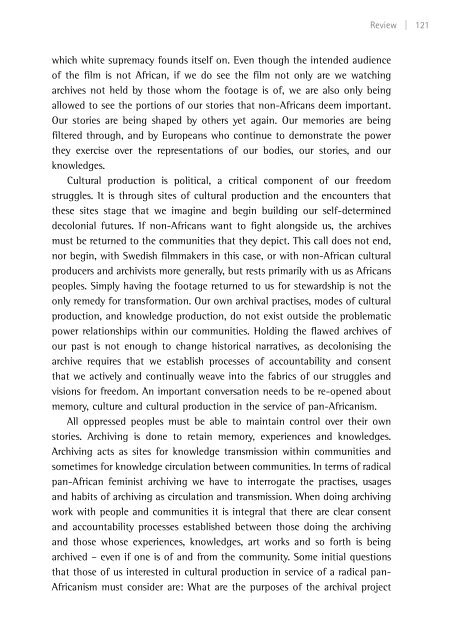Create successful ePaper yourself
Turn your PDF publications into a flip-book with our unique Google optimized e-Paper software.
which white supremacy founds itself on. Even though the intended audience<br />
of the film is not African, if we do see the film not only are we watching<br />
archives not held by those whom the footage is of, we are also only being<br />
allowed to see the portions of our stories that non-Africans deem important.<br />
Our stories are being shaped by others yet again. Our memories are being<br />
filtered through, <strong>and</strong> by Europeans who continue to demonstrate the power<br />
they exercise over the representations of our bodies, our stories, <strong>and</strong> our<br />
knowledges.<br />
Cultural production is political, a critical component of our freedom<br />
struggles. It is through sites of cultural production <strong>and</strong> the encounters that<br />
these sites stage that we imagine <strong>and</strong> begin building our self-determined<br />
decolonial futures. If non-Africans want to fight alongside us, the archives<br />
must be returned to the communities that they depict. This call does not end,<br />
nor begin, with Swedish filmmakers in this case, or with non-African cultural<br />
producers <strong>and</strong> archivists more generally, but rests primarily with us as Africans<br />
peoples. Simply having the footage returned to us for stewardship is not the<br />
only remedy for transformation. Our own archival practises, modes of cultural<br />
production, <strong>and</strong> knowledge production, do not exist outside the problematic<br />
power relationships within our communities. Holding the flawed archives of<br />
our past is not enough to change historical narratives, as decolonising the<br />
archive requires that we establish processes of accountability <strong>and</strong> consent<br />
that we actively <strong>and</strong> continually weave into the fabrics of our struggles <strong>and</strong><br />
visions for freedom. An important conversation needs to be re-opened about<br />
memory, culture <strong>and</strong> cultural production in the service of pan-<strong>Africanism</strong>.<br />
All oppressed peoples must be able to maintain control over their own<br />
stories. Archiving is done to retain memory, experiences <strong>and</strong> knowledges.<br />
Archiving acts as sites for knowledge transmission within communities <strong>and</strong><br />
sometimes for knowledge circulation between communities. In terms of radical<br />
pan-African feminist archiving we have to interrogate the practises, usages<br />
<strong>and</strong> habits of archiving as circulation <strong>and</strong> transmission. When doing archiving<br />
work with people <strong>and</strong> communities it is integral that there are clear consent<br />
<strong>and</strong> accountability processes established between those doing the archiving<br />
<strong>and</strong> those whose experiences, knowledges, art works <strong>and</strong> so forth is being<br />
archived – even if one is of <strong>and</strong> from the community. Some initial questions<br />
that those of us interested in cultural production in service of a radical pan-<br />
<strong>Africanism</strong> must consider are: What are the purposes of the archival project<br />
Review | 121


